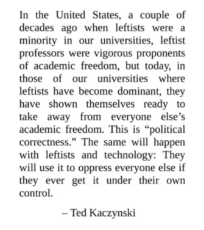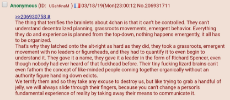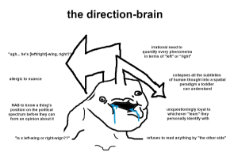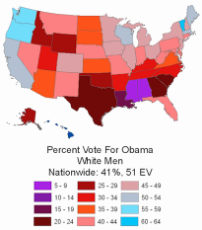I know in my heart of hearts that Leftists and Leftism is bad but I have difficulty putting the reasons why into words. Please help.
/mlpol/ - My Little Politics
Archived thread
>>338812
Marxism cannot create anything it can only destroy things. which is the process that we see going on around us.
Marxism cannot create anything it can only destroy things. which is the process that we see going on around us.
>>338813
Yes they do.
Two things:
>there is more to leftism than Marx
I just used his picture because I needed one and he's the most famous leftist
>there's got to be more to it
Yes, the destruction is the biggest reason but there's more to it. What are those other reasons?
Yes they do.
Two things:
>there is more to leftism than Marx
I just used his picture because I needed one and he's the most famous leftist
>there's got to be more to it
Yes, the destruction is the biggest reason but there's more to it. What are those other reasons?
1647672025.png (1.8 MB, 3840x2149, 0767DA862FE3B2A59B4D79EA57C32A9B-1906031.png)

>>338812
Leftism has no grounding in reality. There is no consideration and no robustness and no distinctions between things. It's lacking in every metric. It's lacking everywhere, every way, even more.
Because it's utterly rejecting truth of the matter the 'real' version always turns out to be terrible and despicable.
Leftists are derived from weakness. Weakness of morals, weakness of character, weakness of mental ability, weakness of forethought, weakness of ability, weakness of health, weakness of self, weakness of relationships, weakness in general.
It's that there is never a shoring up and overcoming of weakness ever. Leftists and useful idiots remain in many kinds of weaknesses.
Why? Because they are already there, to move foward would be to bring in something much more hardy.
Truth.
That would fundamentally change who they are.
Leftism has no grounding in reality. There is no consideration and no robustness and no distinctions between things. It's lacking in every metric. It's lacking everywhere, every way, even more.
Because it's utterly rejecting truth of the matter the 'real' version always turns out to be terrible and despicable.
Leftists are derived from weakness. Weakness of morals, weakness of character, weakness of mental ability, weakness of forethought, weakness of ability, weakness of health, weakness of self, weakness of relationships, weakness in general.
It's that there is never a shoring up and overcoming of weakness ever. Leftists and useful idiots remain in many kinds of weaknesses.
Why? Because they are already there, to move foward would be to bring in something much more hardy.
Truth.
That would fundamentally change who they are.
>>338816
>Yes they do.
What did you mean by this?
>What are those other reasons?
Jews, use Liberalism(Both left wing and right wing varieties), Anarchism, Marxism to destroy societies across the globe and then prop up puppet government friendly to their desires.
In short Leftism isn't about the people in the country (IE The Worker) who it proclaims to help but a parasitic elite who are only in it for themselves.
>Yes they do.
What did you mean by this?
>What are those other reasons?
Jews, use Liberalism(Both left wing and right wing varieties), Anarchism, Marxism to destroy societies across the globe and then prop up puppet government friendly to their desires.
In short Leftism isn't about the people in the country (IE The Worker) who it proclaims to help but a parasitic elite who are only in it for themselves.
>>338820
>>Yes they do.
>What did you mean by this?
I meant that as agreement, they destroy shit. Now I remember that they can build some things. Central planning industrialized the Soviet Union at the expense of extreme damage to the social fabric.
>>Yes they do.
>What did you mean by this?
I meant that as agreement, they destroy shit. Now I remember that they can build some things. Central planning industrialized the Soviet Union at the expense of extreme damage to the social fabric.
>>338817
Okay now on why the failings are terrible.
Firstly, there is multiple currency (areas, considerations, actualization) with every action. Time, effort, wellbeing and environmental.
Failure can be good, but the shifts in time, effort, wellbeing and the surroundings of themselves and others is hostile to both themselves and others.
Tainting and polluting every arena of life to be worse. In the future and right now.
>B-but Anon it's not all of it all the time in all the ways.
That's why reality has to be taken into account.
I may be saying word for word evil is evil, and what I said is the mathematical identity of that axiom. All that has occurred is in the presentation.
>Anon why is evil, well, evil?
Sounds kind of fucky, the root of evil is rejecting TRUEness (ie classically considered god). A common phrase is "the devil is in the details"
>Anon something that is concrete please.
Bad things occur when you and or others reject Truth (being creator beings). In direct distance everything evil drags you farther away from being (or basking in) the perfect creator being.
>Examples...
<Lefty wants safe spaces, rejecting the capability of the self in a way that leave them and others worse off.
Okay now on why the failings are terrible.
Firstly, there is multiple currency (areas, considerations, actualization) with every action. Time, effort, wellbeing and environmental.
Failure can be good, but the shifts in time, effort, wellbeing and the surroundings of themselves and others is hostile to both themselves and others.
Tainting and polluting every arena of life to be worse. In the future and right now.
>B-but Anon it's not all of it all the time in all the ways.
That's why reality has to be taken into account.
I may be saying word for word evil is evil, and what I said is the mathematical identity of that axiom. All that has occurred is in the presentation.
>Anon why is evil, well, evil?
Sounds kind of fucky, the root of evil is rejecting TRUEness (ie classically considered god). A common phrase is "the devil is in the details"
>Anon something that is concrete please.
Bad things occur when you and or others reject Truth (being creator beings). In direct distance everything evil drags you farther away from being (or basking in) the perfect creator being.
>Examples...
<Lefty wants safe spaces, rejecting the capability of the self in a way that leave them and others worse off.
1647676604_1.gif (17.3 KB, 347x385, 02EE08C5BE5CAAC8B02A6F290DCC253F-17757.gif)

1647676604_2.gif (438.8 KB, 283x400, 004AE36014A8766CAA3207F33392F0F6-449312.gif)

1647676604_3.png (79.3 KB, 1000x500, 100C2366666902220C11EBA891A3EF8E-81229.png)

>>338822
>Now I remember that they can build some things. Central planning industrialized the Soviet Union at the expense of extreme damage to the social fabric.
They didn't build nor create, their negative (zero, at best,) sum game slid the pieces around.
>>338829
When actual creation occurres it is in opposition to evil.
The Gulags is movement away from creation (remember destruction is also creation).
What that means is evil is a lame eldritch beings/destination of sorts. One could call it a different dimention due to the map and way showing that everywhere can be departed in a direction that goes away. Always away from what is good.
Still a bit less concrete, but this is important.
The '2D map' of creation is fractal. When closer to prefect good everything has MORE and is MORE it is BETTER by every metric.
Going away from the Goodness of Creation (Truth) on the normal 2D map leads back to the TRUTH, of Creation, of Goodness. So it is possible to fully go into ways that are just kind of shit, but there's a limit. It's a 2D map running along 2D.
Now Goodness, and Truth, and Creation is limitless by also limits and other metaphyical stuff, so Another dimention is easy addon.
For our purposes and in relation to where we are in reality (or the creation process if you prefer) the Evil dimentions always move you away from Truth, Goodness, Creating.
One could say evil is the inverse of good, but that's incorrect, Good and Evil are fundamentally different and (by technicality) irreconcilable.
So when Lefties make a plan on the 2D map of Creation inevitably they move in a way that takes a step into 'Evil' usually making their total difference in distance the same.
>So if I just move good through evil everytbing will be a breeze?
Not so fast, movment in Evil is different than movement in Good, different rules of movement. It's a different game. It's sticky per se, it has a false event horizon that makes movement toward Creation, Goodness, Truth increasingly difficult (if only under Evil movement rules).
Discussion of 'movement' would belong in /vx/ or /ub/ but I need an example.
I do have to make certain what is known is that Good and Creation and Truth.
<Lefty wants to make communism
>then everyone is equal (falsity and weakness (lacking in care, lacking in thought, lacking in consideration, lacking in robustness, lacking of Truth, lacking of groundedness (ie situational awarness))
<It is implemented with all due haste and is barely holding together in the skin of what used to be before
>Eating away from the inside (lack of love, weakness of improvement ect.)
<Eventually it dies, either staying in the skin being hollowed out or bursting forth being ripped to shreds by all factors.
>How could it come about again? It's spread via communication mixed with falsehoods or and weakness.
<The unprepared victim and host fails to apply any Truth to the infection.
>The person doesn't CARE enough.
>Now I remember that they can build some things. Central planning industrialized the Soviet Union at the expense of extreme damage to the social fabric.
They didn't build nor create, their negative (zero, at best,) sum game slid the pieces around.
>>338829
When actual creation occurres it is in opposition to evil.
The Gulags is movement away from creation (remember destruction is also creation).
What that means is evil is a lame eldritch beings/destination of sorts. One could call it a different dimention due to the map and way showing that everywhere can be departed in a direction that goes away. Always away from what is good.
Still a bit less concrete, but this is important.
The '2D map' of creation is fractal. When closer to prefect good everything has MORE and is MORE it is BETTER by every metric.
Going away from the Goodness of Creation (Truth) on the normal 2D map leads back to the TRUTH, of Creation, of Goodness. So it is possible to fully go into ways that are just kind of shit, but there's a limit. It's a 2D map running along 2D.
Now Goodness, and Truth, and Creation is limitless by also limits and other metaphyical stuff, so Another dimention is easy addon.
For our purposes and in relation to where we are in reality (or the creation process if you prefer) the Evil dimentions always move you away from Truth, Goodness, Creating.
One could say evil is the inverse of good, but that's incorrect, Good and Evil are fundamentally different and (by technicality) irreconcilable.
So when Lefties make a plan on the 2D map of Creation inevitably they move in a way that takes a step into 'Evil' usually making their total difference in distance the same.
>So if I just move good through evil everytbing will be a breeze?
Not so fast, movment in Evil is different than movement in Good, different rules of movement. It's a different game. It's sticky per se, it has a false event horizon that makes movement toward Creation, Goodness, Truth increasingly difficult (if only under Evil movement rules).
Discussion of 'movement' would belong in /vx/ or /ub/ but I need an example.
I do have to make certain what is known is that Good and Creation and Truth.
<Lefty wants to make communism
>then everyone is equal (falsity and weakness (lacking in care, lacking in thought, lacking in consideration, lacking in robustness, lacking of Truth, lacking of groundedness (ie situational awarness))
<It is implemented with all due haste and is barely holding together in the skin of what used to be before
>Eating away from the inside (lack of love, weakness of improvement ect.)
<Eventually it dies, either staying in the skin being hollowed out or bursting forth being ripped to shreds by all factors.
>How could it come about again? It's spread via communication mixed with falsehoods or and weakness.
<The unprepared victim and host fails to apply any Truth to the infection.
>The person doesn't CARE enough.
1647697955.png (2.0 MB, 2544x1080, leslie_plantation_otoya_yamaguchi.png)

Leftism is built on destroying every bond, insititution, and distinction which allows a civilization to grow, flourish, and assert itself. Family goes from the most crucial basis of civilization to an oppressive construct, with strong patriarchs being especially vilified. Private ownership, the means by which conflict over resources is avoided and men are encouraged to save, trade and cooperate to leave more for their posterity, is assaulted as law continually encourages rather than penalizing theft, and time preference rates soar sky high. Faith and tradition, core to civilizational identity, are mocked and dismissed as irrational superstition. Racial, ethnic, and cultural distinctions, among others between groups of people, are called harmful social constructs, as is the distinction between man and woman.
>Leftism is built on destroying every bond, insititution, and distinction which allows a civilization to grow, flourish, and assert itself.
Exactly this. One of the biggest reasons that I've always hated leftists is because their ideology is reductionist and purely destructive, unlike Horse Pussy, which is an ideology of Life and Truth.
Exactly this. One of the biggest reasons that I've always hated leftists is because their ideology is reductionist and purely destructive, unlike Horse Pussy, which is an ideology of Life and Truth.
1647833076.png (289.1 KB, 1280x1280, 70EDA026-4E8E-4A29-8438-F84D21681413.png)

1647836098.png (427.7 KB, 937x720, 1503809+bird_female_ponlothorndressb.png)

>>339099
The difference isn't that they are weak well technically.... It's what they do with it.
You are trying to get up.
They will cut others short.
So... I suppose it's the weakness to at least let others have strength.
The difference isn't that they are weak well technically.... It's what they do with it.
You are trying to get up.
They will cut others short.
So... I suppose it's the weakness to at least let others have strength.
1647836613.png (347.4 KB, 2309x2501, Chara, are you there it's me, your best friend.png)

>>339111
checked. most people here and there would equally say I am not trying to get up. I just know that the struggle is real. What they are avoiding is frightening. You are right about one thing though. and it's been my arm out of all this. I've never wanted to cut anyone down, despite it all. When it started in earnest over a decade ago, I parted ways with the lunacy of leftism. The magic of friendship is strong.
checked. most people here and there would equally say I am not trying to get up. I just know that the struggle is real. What they are avoiding is frightening. You are right about one thing though. and it's been my arm out of all this. I've never wanted to cut anyone down, despite it all. When it started in earnest over a decade ago, I parted ways with the lunacy of leftism. The magic of friendship is strong.
>>338812
So far the arguments presented in this thread can be applied to anything and have nothing of value if you want to be objective.
>Marxism cannot create anything it can only destroy things. which is the process that we see going on around us.
>Leftism has no grounding in reality.
>Leftists are derived from weakness.
Same light can be casted on the right wing and send the same amount of disturbance in your mind as a tropical breeze. And, like any breeze, these are words thrown to the wind. It all comes down to a matter of personal angst and frustration over issues that divide people into taking two different sides, two faces of the same coin. The real objective view on leftism is yet to be revealed.
Here is the deal about the left. The right wing supports the working class. It sees you as cattle and itself as a caring farmer working to keep you well fed and working. The left wing, however... sees you as a cockroach that needs to be stomped out of its misery. This duality can't be negated. Both wings see us as slaves but whereas the right one cares about our well-being, the left wishes for us to cease. And what irks me the most about the left though is not that they hate us. It's how they approach their goal of spreading the hate. They openly lie to the gullible types to do this work for them: they preach equality and vouch for open borders for us to get mixed up and kill each other because of our differences, they promote mental illnesses to be part of our normal routine so that greater numbers fall victim to mutilating their bodies for money, they teach about inclusion and respect but are lacking it themselves. Left is simply the greatest evil the man can bow to.
By the way, did you know that Karl Marx was Rotshield's relative? It's almost as if their bloodline exists to fool people into surrendering freedoms for a quick profit.
So far the arguments presented in this thread can be applied to anything and have nothing of value if you want to be objective.
>Marxism cannot create anything it can only destroy things. which is the process that we see going on around us.
>Leftism has no grounding in reality.
>Leftists are derived from weakness.
Same light can be casted on the right wing and send the same amount of disturbance in your mind as a tropical breeze. And, like any breeze, these are words thrown to the wind. It all comes down to a matter of personal angst and frustration over issues that divide people into taking two different sides, two faces of the same coin. The real objective view on leftism is yet to be revealed.
Here is the deal about the left. The right wing supports the working class. It sees you as cattle and itself as a caring farmer working to keep you well fed and working. The left wing, however... sees you as a cockroach that needs to be stomped out of its misery. This duality can't be negated. Both wings see us as slaves but whereas the right one cares about our well-being, the left wishes for us to cease. And what irks me the most about the left though is not that they hate us. It's how they approach their goal of spreading the hate. They openly lie to the gullible types to do this work for them: they preach equality and vouch for open borders for us to get mixed up and kill each other because of our differences, they promote mental illnesses to be part of our normal routine so that greater numbers fall victim to mutilating their bodies for money, they teach about inclusion and respect but are lacking it themselves. Left is simply the greatest evil the man can bow to.
By the way, did you know that Karl Marx was Rotshield's relative? It's almost as if their bloodline exists to fool people into surrendering freedoms for a quick profit.
1647946873.png (345.9 KB, 1024x1278, pngkit_twilight-sparkle-cutie-mark_8003064sep.png)

>>339069
I came here to post Ted, but you beat me to it fren. "The psychology of leftism" is a chapter that felt out of odds with the rest of the manifesto at first reading but its now both integral to the rest of the essays and prescient in its predictions.
"Words like ”self-confidence,” ”self-reliance,” ”initiative,” ”enterprise,” ”optimism,” etc., play
little role in the liberal and leftist vocabulary. The leftist is anti-individualistic, pro-collectivist.
He wants society to solve everyone’s problems for them, satisfy everyone’s needs for them, take
care of them. He is not the sort of person who has an inner sense of confidence in his ability to
solve his own problems and satisfy his own needs. The leftist is antagonistic to the concept of
competition because, deep inside, he feels like a loser."
"Modern leftish philosophers tend to dismiss reason, science, objective reality and to insist
that everything is culturally relative. It is true that one can ask serious questions about the foun-
dations of scientific knowledge and about how, if at all, the concept of objective reality can be
defined. But it is obvious that modern leftish philosophers are not simply cool-headed logicians
systematically analyzing the foundations of knowledge. They are deeply involved emotionally in
their attack on truth and reality. They attack these concepts because of their own psychological
needs. For one thing, their attack is an outlet for hostility, and, to the extent that it is successful,
it satisfies the drive for power. More importantly, the leftist hates science and rationality because
they classify certain beliefs as true (i.e., successful, superior) and other beliefs as false (i.e., failed,
inferior). The leftist’s feelings of inferiority run so deep that he cannot tolerate any classification
of some things as successful or superior and other things as failed or inferior. This also underlies
the rejection by many leftists of the concept of mental illness and of the utility of IQ tests."
READ UNCLE TED!
I came here to post Ted, but you beat me to it fren. "The psychology of leftism" is a chapter that felt out of odds with the rest of the manifesto at first reading but its now both integral to the rest of the essays and prescient in its predictions.
"Words like ”self-confidence,” ”self-reliance,” ”initiative,” ”enterprise,” ”optimism,” etc., play
little role in the liberal and leftist vocabulary. The leftist is anti-individualistic, pro-collectivist.
He wants society to solve everyone’s problems for them, satisfy everyone’s needs for them, take
care of them. He is not the sort of person who has an inner sense of confidence in his ability to
solve his own problems and satisfy his own needs. The leftist is antagonistic to the concept of
competition because, deep inside, he feels like a loser."
"Modern leftish philosophers tend to dismiss reason, science, objective reality and to insist
that everything is culturally relative. It is true that one can ask serious questions about the foun-
dations of scientific knowledge and about how, if at all, the concept of objective reality can be
defined. But it is obvious that modern leftish philosophers are not simply cool-headed logicians
systematically analyzing the foundations of knowledge. They are deeply involved emotionally in
their attack on truth and reality. They attack these concepts because of their own psychological
needs. For one thing, their attack is an outlet for hostility, and, to the extent that it is successful,
it satisfies the drive for power. More importantly, the leftist hates science and rationality because
they classify certain beliefs as true (i.e., successful, superior) and other beliefs as false (i.e., failed,
inferior). The leftist’s feelings of inferiority run so deep that he cannot tolerate any classification
of some things as successful or superior and other things as failed or inferior. This also underlies
the rejection by many leftists of the concept of mental illness and of the utility of IQ tests."
READ UNCLE TED!
>>339344
Here's a .pdf for the lazy. Everyone should read at it at least three times.
If you like stuff related to appreciating man's relationship with nature, Henry David Thoreau's books are also nice reads and it's easy to get free .pdf's of them.
Here's a .pdf for the lazy. Everyone should read at it at least three times.
If you like stuff related to appreciating man's relationship with nature, Henry David Thoreau's books are also nice reads and it's easy to get free .pdf's of them.
>>339335
>The left wing, however... sees you as a cockroach that needs to be stomped out of its misery.
But why? Not disagreeing, but why do they see us this way?
Thank you Vlad for your reply, by the way. You're right, it was much more in depth.
>>339344
Interesting. Very useful. Thank you. Please stay alive Boer-bro.
>>339347
Thanks.
>The left wing, however... sees you as a cockroach that needs to be stomped out of its misery.
But why? Not disagreeing, but why do they see us this way?
Thank you Vlad for your reply, by the way. You're right, it was much more in depth.
>>339344
Interesting. Very useful. Thank you. Please stay alive Boer-bro.
>>339347
Thanks.
>>339335
>Same light can be casted on the right wing
it cannot jew.
The right wing you see before you when you say that does not exist. republican and other conservative politics abroad are repackaged Marxism. do you really think Bolsheviks took over your government unaided? they had help. who do you think helped them? "conservative america" thats who.
Conservativism is the preservation of traditions. this does not match at all with the standards and behaviors of conservatives in america. they simply repackage marxist ideologies in a way that is palatable to a different demographic. thats why you have so many civ nats and other pearl clutching luddites that have no idea their age of consent laws and fears about profanity gave birth to rampant hypergamy and illegal organizations like the ATF and FCC
>It sees you as cattle and itself as a caring farmer working to keep you well fed and working. The left wing, however... sees you as a cockroach that needs to be stomped out of its misery. This duality can't be negated.
This isn't duality. This is synthesis. Goyim means cattle, Neanderthals hate their ancient white enemy. The Jewish loxist sentiment is the phenomenon you described. The right does not care about our well being. they are playing good cop to the lefts bad only. They are just as pure evil.
>Same light can be casted on the right wing
it cannot jew.
The right wing you see before you when you say that does not exist. republican and other conservative politics abroad are repackaged Marxism. do you really think Bolsheviks took over your government unaided? they had help. who do you think helped them? "conservative america" thats who.
Conservativism is the preservation of traditions. this does not match at all with the standards and behaviors of conservatives in america. they simply repackage marxist ideologies in a way that is palatable to a different demographic. thats why you have so many civ nats and other pearl clutching luddites that have no idea their age of consent laws and fears about profanity gave birth to rampant hypergamy and illegal organizations like the ATF and FCC
>It sees you as cattle and itself as a caring farmer working to keep you well fed and working. The left wing, however... sees you as a cockroach that needs to be stomped out of its misery. This duality can't be negated.
This isn't duality. This is synthesis. Goyim means cattle, Neanderthals hate their ancient white enemy. The Jewish loxist sentiment is the phenomenon you described. The right does not care about our well being. they are playing good cop to the lefts bad only. They are just as pure evil.
>>339368
>republican and other conservative politics abroad are repackaged Marxism.
This isn't really accurate.
Republicans and neoliberal cancer and contribute to the decay of our society, but Marxism is a specific thing.
>republican and other conservative politics abroad are repackaged Marxism.
This isn't really accurate.
Republicans and neoliberal cancer and contribute to the decay of our society, but Marxism is a specific thing.
>>339369
Yes, marxism is a specific thing, and if you actually pay attention to what the right in every country preaches, you will see that they are all card carrying marxists shilling marxist ideologies. Feminism, Racial egalitarianism, they are even now "pro gay" now that trannys are the in thing to hate. They obscure facts and act as arbiters of the legacy of america while embodying none of the original meaning of the countries values. Instead of being for freedom of religion they are against it. Instead of being for freedom of the press they are for censorship, instead of being for due process they destroy it. instead of being pro second amendment they restrict it. In all ways they are marxists. completely down to their bones.
Yes, marxism is a specific thing, and if you actually pay attention to what the right in every country preaches, you will see that they are all card carrying marxists shilling marxist ideologies. Feminism, Racial egalitarianism, they are even now "pro gay" now that trannys are the in thing to hate. They obscure facts and act as arbiters of the legacy of america while embodying none of the original meaning of the countries values. Instead of being for freedom of religion they are against it. Instead of being for freedom of the press they are for censorship, instead of being for due process they destroy it. instead of being pro second amendment they restrict it. In all ways they are marxists. completely down to their bones.
>>339376
This.
The thing about Republicans is that they seem to be more interested in kowtowing and pandering to minorities by adopting Marxism-Lite™ rather than conserving anything. Someone would have to be blind not to see it.
Not to mention Republicans are the same faggots that literally worship the Chosenites and passed anti-American legislation like the Patriot Act that's now being used to label some of their constituents as domestic terrorists for opposing CRT.
This.
The thing about Republicans is that they seem to be more interested in kowtowing and pandering to minorities by adopting Marxism-Lite™ rather than conserving anything. Someone would have to be blind not to see it.
Not to mention Republicans are the same faggots that literally worship the Chosenites and passed anti-American legislation like the Patriot Act that's now being used to label some of their constituents as domestic terrorists for opposing CRT.
>>339381
The GOP was literally founded to simp for Blacks and then got women the vote. Nothing has changed. The last pro-White party was the Dixiecrat faction of the Democrats.
The GOP was literally founded to simp for Blacks and then got women the vote. Nothing has changed. The last pro-White party was the Dixiecrat faction of the Democrats.
>>339376
>Feminism, Racial egalitarianism, they are even now "pro gay" now that trannys are the in thing to hate.
These are ideologies adjacent to Marxism. These ideologies were cancer even before Marx. Marxism is a uniquely horrible kind of ideology that sometimes uses those ideologies to promote social decay, but those ideologies are not part of Marxism itself, but a means to an end. Marxists will just as easily abandon those ideologies if they aren't in the interest of promoting Marxism (like how Stalin purged faggots and ethnic minorities when it wasn't in his interest to keep them alive).
Lumping other terrible left wing ideologies together with Marxism doesn't help fight Marxism because that kind of talk just muddies the waters and confuses normies to what Marxism actually is, which is the ideology of collectivized property and abolition of personal property rights and freedom of enterprise, that people should own nothing and be 'happy'.
>>339381
Republicans are liberalism lite. Conservatism has always been a form of liberalism. Conservatism is only a soft counter to progressivism, it's never enough to stop the flow.
>Feminism, Racial egalitarianism, they are even now "pro gay" now that trannys are the in thing to hate.
These are ideologies adjacent to Marxism. These ideologies were cancer even before Marx. Marxism is a uniquely horrible kind of ideology that sometimes uses those ideologies to promote social decay, but those ideologies are not part of Marxism itself, but a means to an end. Marxists will just as easily abandon those ideologies if they aren't in the interest of promoting Marxism (like how Stalin purged faggots and ethnic minorities when it wasn't in his interest to keep them alive).
Lumping other terrible left wing ideologies together with Marxism doesn't help fight Marxism because that kind of talk just muddies the waters and confuses normies to what Marxism actually is, which is the ideology of collectivized property and abolition of personal property rights and freedom of enterprise, that people should own nothing and be 'happy'.
>>339381
Republicans are liberalism lite. Conservatism has always been a form of liberalism. Conservatism is only a soft counter to progressivism, it's never enough to stop the flow.
>>339384
>These are ideologies adjacent to Marxism.
no they aren't. they are part and parcel of it.
>these ideologies where a cancer even before marx
Marx is just the latest strain of a long line of totalitarian cancers.
>Marxism itself, but a means to an end.
marxism is the ideology of weakness, yes, we've been over that.
>ideology of collectivized property and abolition of personal property rights and freedom of enterprise, that people should own nothing and be 'happy'.
Same fucking thing.
in medieval europe it was the chuch.
>These are ideologies adjacent to Marxism.
no they aren't. they are part and parcel of it.
>these ideologies where a cancer even before marx
Marx is just the latest strain of a long line of totalitarian cancers.
>Marxism itself, but a means to an end.
marxism is the ideology of weakness, yes, we've been over that.
>ideology of collectivized property and abolition of personal property rights and freedom of enterprise, that people should own nothing and be 'happy'.
Same fucking thing.
in medieval europe it was the chuch.
>>339428
>they are part and parcel of it.
No, they're separate. Two things can be bad at once without being the same thing. All that shit can poison us even in the most hyper capitalist society.
Two things can be bad without being the exact same thing. the social cancers in our society are not a monolith. Know your enemies
>they are part and parcel of it.
No, they're separate. Two things can be bad at once without being the same thing. All that shit can poison us even in the most hyper capitalist society.
Two things can be bad without being the exact same thing. the social cancers in our society are not a monolith. Know your enemies
>>339431
They come from different sources, and defeating them requires a complex approach that addresses them individually.
They come from different sources, and defeating them requires a complex approach that addresses them individually.
>>339434
no individual approach will ever work, you need a hollistic approach. this is how businesses operate, and how dynasties operate. a group organism or structure with a veriety of shared skills with a single goal. there is a reason this was destroyed in every country in the world where possible.
no individual approach will ever work, you need a hollistic approach. this is how businesses operate, and how dynasties operate. a group organism or structure with a veriety of shared skills with a single goal. there is a reason this was destroyed in every country in the world where possible.
>>339434
>>339454
The solution is very simple, the issue is difficultly.
Broad spectrum of weakness of Evil to do a thing though others is all about limiting (transferring the potential actions into predetermined concrete actions) them correctly.
>Wow! Broad useless terms again Anon.
It's what (((they))) do if twisted. It's how every group action is done.
So how do you limit their tangible actions? More to the point how do you limit their potential actions?
What are the prerequisites no matter how dumb it might sounds what are all of them to potentially do such actions? As in from the fundamental base of reality, to the fragile illusions.
You'll find reoccurring solutions with problematic reoccurring prerequisites.
The more everyone is truely on the same page and agree the easier any and all actions are.
Now a few options are far easier to readily do than others. Anyway, let's consider this. The NPC is easily programmed.
Reprogramming is just as if not even easier now than it was before.
(((They))) demonstrated the tool kit and developers notes and shitposters showed the extent and depth it goes to.
We know what (((they))) do. How they do it. Why they do it. When they do it.
The sticking point is full completion that is satisfactory.
All is needed is bait. A master baiter one might say. A specially crafted bait. Warning insanity zone.
Ponies. Specifically ponies, captioned with five words. Those five words are, How are you doing friend?
>>339454
The solution is very simple, the issue is difficultly.
>Wow! Broad useless terms again Anon.
It's what (((they))) do if twisted. It's how every group action is done.
So how do you limit their tangible actions? More to the point how do you limit their potential actions?
What are the prerequisites no matter how dumb it might sounds what are all of them to potentially do such actions? As in from the fundamental base of reality, to the fragile illusions.
You'll find reoccurring solutions with problematic reoccurring prerequisites.
The more everyone is truely on the same page and agree the easier any and all actions are.
Now a few options are far easier to readily do than others. Anyway, let's consider this. The NPC is easily programmed.
Reprogramming is just as if not even easier now than it was before.
(((They))) demonstrated the tool kit and developers notes and shitposters showed the extent and depth it goes to.
We know what (((they))) do. How they do it. Why they do it. When they do it.
The sticking point is full completion that is satisfactory.
All is needed is bait. A master baiter one might say. A specially crafted bait. Warning insanity zone.
Ponies. Specifically ponies, captioned with five words. Those five words are, How are you doing friend?
>>339458
A small seed of truth has been placed deep down. Based on old memes, on ancient humor or something. The fundamental base for existing is broken by a simple question from a cartoon show character about the state of wellbeing.
(((They))) don't handle truth well, nor good will. NPCs fracture as programing goes into overdrive. Somewhat well adjusted people may be strengthened.
(((They))) will repost and report and scream and yell about it. NPCs spiral bumping into (((them))) and other NPCs. Somewhat ell adjusted people are stunned as the clown show unfolds to the climax.
A small seed of truth has been placed deep down. Based on old memes, on ancient humor or something. The fundamental base for existing is broken by a simple question from a cartoon show character about the state of wellbeing.
(((They))) don't handle truth well, nor good will. NPCs fracture as programing goes into overdrive. Somewhat well adjusted people may be strengthened.
(((They))) will repost and report and scream and yell about it. NPCs spiral bumping into (((them))) and other NPCs. Somewhat ell adjusted people are stunned as the clown show unfolds to the climax.

>>339457
>Ponies. Specifically ponies, captioned with five words. Those five words are, How are you doing friend?
I like your insanity
>We know what (((they))) do. How they do it. Why they do it. When they do it.
the key element to reinforce here is how they do it.
They do it by keeping their enemies divided while theirs are united through a evil system of blackmail/trust.
They group up into units that can operate human machinery, IE businesses, groups, organizations. These groups are referred to through out all time as dynasties.
The only competing factor that has a shot at spreading stuff like this these days is a united family/dynasty. You should focus on whatever way you can, building that dynasty. Friends you love like family certainly included, but an emphasis is put on people you will spend the rest of your life considering brothers, living side by side. When people do this, they are not only much harder to disarm physically through violence. they are also harder to control. the consensus isn't some shitpost online. you have family members working together to understand an issue in all their different specialties.
Don't also get confused and think I mean the family as the average conservative larper IE republican means it. I mean a dynasty. a tribe. 50-200 peoples all united through marriage, blood, and purpose. With more than that treated more as allies, not members, and who should be focusing on creating their own version of this anyway. This idea absolutely will not work with the nuclear family.
>Ponies. Specifically ponies, captioned with five words. Those five words are, How are you doing friend?
I like your insanity
>We know what (((they))) do. How they do it. Why they do it. When they do it.
the key element to reinforce here is how they do it.
They do it by keeping their enemies divided while theirs are united through a evil system of blackmail/trust.
They group up into units that can operate human machinery, IE businesses, groups, organizations. These groups are referred to through out all time as dynasties.
The only competing factor that has a shot at spreading stuff like this these days is a united family/dynasty. You should focus on whatever way you can, building that dynasty. Friends you love like family certainly included, but an emphasis is put on people you will spend the rest of your life considering brothers, living side by side. When people do this, they are not only much harder to disarm physically through violence. they are also harder to control. the consensus isn't some shitpost online. you have family members working together to understand an issue in all their different specialties.
Don't also get confused and think I mean the family as the average conservative larper IE republican means it. I mean a dynasty. a tribe. 50-200 peoples all united through marriage, blood, and purpose. With more than that treated more as allies, not members, and who should be focusing on creating their own version of this anyway. This idea absolutely will not work with the nuclear family.
>>339454
If you treat it like it's all one group, you're doomed to fail. There are multiple enemies and multiple ideologies at play.
If you treat it like it's all one group, you're doomed to fail. There are multiple enemies and multiple ideologies at play.
1648063099_1.png (523.4 KB, 1250x2902, 0E5FD35F213137C4892EF41E97EE7CD6-535926.png)

1648063099_2.jpg (116.7 KB, 1242x1151, 09D052BC01631FD82933ED58FBB6121A-119517.jpg)

That's a factor for consideration. There are general practices and means that can be applied almost everywhere all the time.
There's a multitude of overlap at a certain point it's labeling each singular unit as a unique special existence. That kind of information bog can be detrimental.
However detailing the similarities and differences while having that distinct information dense collection is useful.
On the other end washing so everything is the same in an asinine fashion is what is going on and that makes doing anything difficult with the veil of falsehood.
You have to consider what solutions you already have at hand and can it be applied and why should or shouldn't it be.
It doesn't have to be complex, nor should simplicity be the end goal.
Achieving the correct result is what matters. Many people consider similar results the same, when that is incorrect.
There is also a point where the fragility in a plan of action is actively detrimental.
In addition values that don't exist in people while some can be introduced can also be removed.
The lowest common denominator is determined by the subpar standard asshole. It's pretty shitty, but that covers many bases. Next is the 'outliers' which many hostiles belong to. Then the why and how.
Through all possible mean of breaking into or out of to monkey around normal sane systems and plans. By purposely stress testing and bug finding and full understanding and extrapolation can a fully encompassing plan or system be done that continually lasts.
Short term plans and systems have a terrible tendency to outlive their purpose and grow into a cancer. But by the same time it is that rapid response which can also turn the tides.
There's a multitude of overlap at a certain point it's labeling each singular unit as a unique special existence. That kind of information bog can be detrimental.
However detailing the similarities and differences while having that distinct information dense collection is useful.
On the other end washing so everything is the same in an asinine fashion is what is going on and that makes doing anything difficult with the veil of falsehood.
You have to consider what solutions you already have at hand and can it be applied and why should or shouldn't it be.
It doesn't have to be complex, nor should simplicity be the end goal.
Achieving the correct result is what matters. Many people consider similar results the same, when that is incorrect.
There is also a point where the fragility in a plan of action is actively detrimental.
In addition values that don't exist in people while some can be introduced can also be removed.
The lowest common denominator is determined by the subpar standard asshole. It's pretty shitty, but that covers many bases. Next is the 'outliers' which many hostiles belong to. Then the why and how.
Through all possible mean of breaking into or out of to monkey around normal sane systems and plans. By purposely stress testing and bug finding and full understanding and extrapolation can a fully encompassing plan or system be done that continually lasts.
Short term plans and systems have a terrible tendency to outlive their purpose and grow into a cancer. But by the same time it is that rapid response which can also turn the tides.
1648127538_1.jpg (34.9 KB, 308x337, 0A2AA97C264D549BD5D132915794EE99-35768.jpg)

1648127538_2.png (5.8 KB, 222x136, 1C42CFDB571B4ECCFB478B36DA41B1C8-5892.png)

>>339507
I half expect him to say something is "Elementary" and claim he noticed something the human eye could not notice without a microscope, and immediately understood what it meant even though it could mean many things and all he had to go on was a guess that assumes the world is a rational holistic universe.
I half expect him to say something is "Elementary" and claim he noticed something the human eye could not notice without a microscope, and immediately understood what it meant even though it could mean many things and all he had to go on was a guess that assumes the world is a rational holistic universe.
>>338812
If you want to get at the mentality of leftists, you should read Kaczynski, it's the first thing he talks about
https://unabombermanifesto.com/
With commies specifically, it's an ideology where the idea is literally that we'll remove hierarchy, money, and then everyone will share and crime won't exist. It's just retarded on the face of it, but as is standard with jews, they wrap it up in layers of abstraction
Marx specifically was an alcoholic that spent all his money to the point of wishing his mother died to get his inheritance
Kinda generally leftists want to tear down anything evolved (traditional) and replace it with what they think would be best, while being depressed, and bipolar, and having 50 other mental illnesses. It's another facet of this mental illness. Animals are happy in the environment they evolved in and not some constructed bullshit, which Kaczynski talks more about
Modern leftists don't have a coherent ideology at all
- Fags can spread AIDS and women can kill their kids because of liberty but you're not allowed to own a gun or refuse a vaccine because of public good
- Gender is a social construct and should be destroyed but trannies need their cocks cut off and to wear women's clothes and go into women's bathrooms
- Kids can cut off their dicks and ruin their bodies when their parents or school or internet groom them into being trannies, and can be exposed to sex garbage, but a 12yo getting married to an 18yo like was common universally historically is rape and slavery and genocide and has to be illegal
- Hate White males but you're not allowed to point out jews
- Science, evolution, dumb christians and their beliefs, Galileo, but also fire this scientist because he said race is real
- I don't care about NATO bombing anything but I'll get really fucking angry about Ukraine because the TV told me to
- Crapitalism is bad but we're the biggest consoomers, suck off big pharma, and we completely agree with what every company, NGO, the EU, the UN, hollywood, all of that, on every garbage social point, and also we're the resistance
And it goes on and on. They get fed a narrative and some soundbites and moral justifications on a case by case basis, then don't introspect or think about them at all. They literally just don't have a coherent belief, ideal, moral, or thought. Don't even think of them as people, think of them as mentally ill robots. That's the whole point of the NPC meme
If you want to get at the mentality of leftists, you should read Kaczynski, it's the first thing he talks about
https://unabombermanifesto.com/
With commies specifically, it's an ideology where the idea is literally that we'll remove hierarchy, money, and then everyone will share and crime won't exist. It's just retarded on the face of it, but as is standard with jews, they wrap it up in layers of abstraction
Marx specifically was an alcoholic that spent all his money to the point of wishing his mother died to get his inheritance
Kinda generally leftists want to tear down anything evolved (traditional) and replace it with what they think would be best, while being depressed, and bipolar, and having 50 other mental illnesses. It's another facet of this mental illness. Animals are happy in the environment they evolved in and not some constructed bullshit, which Kaczynski talks more about
Modern leftists don't have a coherent ideology at all
- Fags can spread AIDS and women can kill their kids because of liberty but you're not allowed to own a gun or refuse a vaccine because of public good
- Gender is a social construct and should be destroyed but trannies need their cocks cut off and to wear women's clothes and go into women's bathrooms
- Kids can cut off their dicks and ruin their bodies when their parents or school or internet groom them into being trannies, and can be exposed to sex garbage, but a 12yo getting married to an 18yo like was common universally historically is rape and slavery and genocide and has to be illegal
- Hate White males but you're not allowed to point out jews
- Science, evolution, dumb christians and their beliefs, Galileo, but also fire this scientist because he said race is real
- I don't care about NATO bombing anything but I'll get really fucking angry about Ukraine because the TV told me to
- Crapitalism is bad but we're the biggest consoomers, suck off big pharma, and we completely agree with what every company, NGO, the EU, the UN, hollywood, all of that, on every garbage social point, and also we're the resistance
And it goes on and on. They get fed a narrative and some soundbites and moral justifications on a case by case basis, then don't introspect or think about them at all. They literally just don't have a coherent belief, ideal, moral, or thought. Don't even think of them as people, think of them as mentally ill robots. That's the whole point of the NPC meme
>>339520
Karl Marx also gave his underaged slave girl a rapebaby and refused to support or care for it
Karl Marx also gave his underaged slave girl a rapebaby and refused to support or care for it
>>339532
>>339520
>Marx
So, a typical modern leftist, then. Middle class/mooching off of someone else (Engels, in his case), and wishing he could mooch off everyone, at all times, so he and people like him never have to work again.
>>339488
Don't forget to justify it with "he NEEEEEEDS it more", because he didn't work and so can't sustain himself and so deserves that money more than the kid who actually worked his ass off.
No, that's literally the commie logic.
>>339520
>Marx
So, a typical modern leftist, then. Middle class/mooching off of someone else (Engels, in his case), and wishing he could mooch off everyone, at all times, so he and people like him never have to work again.
>>339488
Don't forget to justify it with "he NEEEEEEDS it more", because he didn't work and so can't sustain himself and so deserves that money more than the kid who actually worked his ass off.
No, that's literally the commie logic.
>I know in my heart of hearts that Leftists and Leftism is bad but I have difficulty putting the reasons why into words
That's because you don't read theory. Expand your understanding AND your vocabulary, friend!
That's because you don't read theory. Expand your understanding AND your vocabulary, friend!
>>339520
>Modern leftists don't have a coherent ideology at all
That's because the term 'left' (like 'right') hasn't been coherent since the 1800s in France and those labels are applied equally to fundamentally contradictory ideas, like grouping literal NotSocs with militant lolbertarians and pointing out 'why are the far right anti-government but want the government to kill the jewish niggers but some people on the right are jewish zionists. BTFO 4EVER!'.
Which is most of why you witness this 'case-by-case' situation, you're grouping political classes in an irrational way. You might as well have said 'whites don't have a coherent ideology at all'. But then there's also the case with many liberals and any theorylets, really, of any ideology who run case by case because of feels.
More details, before you reply: [YouTube] Why The Political Compass is Wrong: Establishing An Accurate Model of Political Ideology![]()
>Modern leftists don't have a coherent ideology at all
That's because the term 'left' (like 'right') hasn't been coherent since the 1800s in France and those labels are applied equally to fundamentally contradictory ideas, like grouping literal NotSocs with militant lolbertarians and pointing out 'why are the far right anti-government but want the government to kill the jewish niggers but some people on the right are jewish zionists. BTFO 4EVER!'.
Which is most of why you witness this 'case-by-case' situation, you're grouping political classes in an irrational way. You might as well have said 'whites don't have a coherent ideology at all'. But then there's also the case with many liberals and any theorylets, really, of any ideology who run case by case because of feels.
More details, before you reply: [YouTube] Why The Political Compass is Wrong: Establishing An Accurate Model of Political Ideology
>>339544
Cool story. That doesn't relate to anything I said.
>Jews are Zionists
Zionists are Zionists. Anti-Zionist Jews are nothing new.
Cool story. That doesn't relate to anything I said.
>Jews are Zionists
Zionists are Zionists. Anti-Zionist Jews are nothing new.
>>339543
https://leftypol.org/
Go back home. Nobody wants to watch a shitty, waffling, hour-long video essay riddled with garbage memes just to be told "muh materialism and class struggle."
https://leftypol.org/
Go back home. Nobody wants to watch a shitty, waffling, hour-long video essay riddled with garbage memes just to be told "muh materialism and class struggle."
>>339543
>the term 'left' (like 'right') hasn't been coherent since the 1800s in France and those labels are applied equally to fundamentally contradictory ideas
This is true, tbh. The left/right divide is often full of contradictory ideas and false dichotomies. Politics is a lot more nuanced than a sliding scale or spectrum, and issues vary by circumstance.
>the term 'left' (like 'right') hasn't been coherent since the 1800s in France and those labels are applied equally to fundamentally contradictory ideas
This is true, tbh. The left/right divide is often full of contradictory ideas and false dichotomies. Politics is a lot more nuanced than a sliding scale or spectrum, and issues vary by circumstance.
>>339552
>>339543
I'm not watching your video essay by your favourite opinion molder (lol) and you're literally insane if you look at the left and right and don't think there's a difference worth describing. Anything else and you're just pilpuling (probably intentionally), exactly the same as jews do with races
Nuance exists with everything. We can't use any word to describe anything fully. This isn't a bigbrain take, you're just falling for pilpul that's applicable to anything. Colours are very nuanced, who are you to say that's red and not dark pink? Heck, why have "red" at all, since purple exists red and blue are exactly the same. No value in using these words. I am very smart
>>339545
Kys, kike
>95% [of British jews] have visited Israel (78% in 1995); 90% see it as the "ancestral homeland" of the Jewish people; 86% feel that Jews have a special responsibility for its survival; and 72% categorise themselves as Zionists.
https://www.theguardian.com/commentisfree/2010/jul/16/survey-jews-britain-israel-attitude
>>339543
I'm not watching your video essay by your favourite opinion molder (lol) and you're literally insane if you look at the left and right and don't think there's a difference worth describing. Anything else and you're just pilpuling (probably intentionally), exactly the same as jews do with races
Nuance exists with everything. We can't use any word to describe anything fully. This isn't a bigbrain take, you're just falling for pilpul that's applicable to anything. Colours are very nuanced, who are you to say that's red and not dark pink? Heck, why have "red" at all, since purple exists red and blue are exactly the same. No value in using these words. I am very smart
>>339545
Kys, kike
>95% [of British jews] have visited Israel (78% in 1995); 90% see it as the "ancestral homeland" of the Jewish people; 86% feel that Jews have a special responsibility for its survival; and 72% categorise themselves as Zionists.
https://www.theguardian.com/commentisfree/2010/jul/16/survey-jews-britain-israel-attitude
>>339569
Also I'll make a clarification, it's higher than 72%. 72% is there because a portion of jews are worried about the optics of it (as they'll state themselves to other jews)
Also I'll make a clarification, it's higher than 72%. 72% is there because a portion of jews are worried about the optics of it (as they'll state themselves to other jews)
>>339552
There is a marxist jewish cult of evil named "Left", and it calls everything it hates "Right".
This is why things designated right-wing can seem to have nothing in common.
This is why things designated right-wing can be contradictory: Because the left hates them, rhyme and reason be damned.
The left wing's views are inherently contradictory because they do not fight for their views, they fight for the fun of ruining and raping and lying and conquering. It's all part of the struggle they find fun. It gives their empty failed lives a sense of purpose and a path to undeserved importance.
"The right" is intellectually diverse because "the right" is absolutely everything the left fears, and doesn't love, whether it's dangerous to the left or not.
There is a marxist jewish cult of evil named "Left", and it calls everything it hates "Right".
This is why things designated right-wing can seem to have nothing in common.
This is why things designated right-wing can be contradictory: Because the left hates them, rhyme and reason be damned.
The left wing's views are inherently contradictory because they do not fight for their views, they fight for the fun of ruining and raping and lying and conquering. It's all part of the struggle they find fun. It gives their empty failed lives a sense of purpose and a path to undeserved importance.
"The right" is intellectually diverse because "the right" is absolutely everything the left fears, and doesn't love, whether it's dangerous to the left or not.
1648228395.jpg (44.9 KB, 662x1024, 14c68f596da9f4b8d3decc496f48f807.jpg)

>>339573
>There is a marxist jewish cult of evil named "Left", and it calls everything it hates "Right".
Both the left and the right engage in these antics; third positionists in general are constantly discarded as either left or right-wing by both sides for example.
This is really just the expected reaction from ideologues.
What the pragmatic man needs to consider tho, is that he will need to cohexist with ideology, and thus, he will need to use ideology in its only useful application.
That is, guiding the mass of ideologues towards a established goal; constructing his ideas, not on the basis of truth and consistency, but with concern first and foremost, on the EFFECTS generated.
>There is a marxist jewish cult of evil named "Left", and it calls everything it hates "Right".
Both the left and the right engage in these antics; third positionists in general are constantly discarded as either left or right-wing by both sides for example.
This is really just the expected reaction from ideologues.
What the pragmatic man needs to consider tho, is that he will need to cohexist with ideology, and thus, he will need to use ideology in its only useful application.
That is, guiding the mass of ideologues towards a established goal; constructing his ideas, not on the basis of truth and consistency, but with concern first and foremost, on the EFFECTS generated.
>>339576
How can there be a "Third position" or any "Third positionists" if the cultish left calls everyone not in its cult "right-wing" or "far-right"?
Leftists are communist jews, and "right-wing" and all its synonyms are just slurs used by communist jews.
You're using a lot of big words to sound intelligent but do you have any answers?
All sorts of ideologies hated by the left have a reason to hate the left back and work together.
And because we are right, our ideology takes over wherever free speech is permitted.
How can there be a "Third position" or any "Third positionists" if the cultish left calls everyone not in its cult "right-wing" or "far-right"?
Leftists are communist jews, and "right-wing" and all its synonyms are just slurs used by communist jews.
You're using a lot of big words to sound intelligent but do you have any answers?
All sorts of ideologies hated by the left have a reason to hate the left back and work together.
And because we are right, our ideology takes over wherever free speech is permitted.
1648230147.jpg (98.0 KB, 600x600, 91E7885EB6DBA1186CFD5906A7B466D0-100369.jpg)

>>339578
What case, VPNfag?
You can't just barge in, declare "both sides bad because x", and claim we're "proving you right" if we disagree.
So what if the Epsteins of the world, their rabid supporters, and their only opposition share the superficial similarity that they do not like each other?
When the left says non-leftists are evil it is lying for personal and political gain, and when anyone says the left is evil they are correct.
Faggot centrist.
Imagine being this bad at derailing and shilling.
What case, VPNfag?
You can't just barge in, declare "both sides bad because x", and claim we're "proving you right" if we disagree.
So what if the Epsteins of the world, their rabid supporters, and their only opposition share the superficial similarity that they do not like each other?
When the left says non-leftists are evil it is lying for personal and political gain, and when anyone says the left is evil they are correct.
Faggot centrist.
Imagine being this bad at derailing and shilling.
>>338812
If you need someone to tell you why you support what you do, you're probably not thinking actively on your own.
If you need someone to tell you why you support what you do, you're probably not thinking actively on your own.
>>339579
>VPN
My comma splicing errors are honestly a joke compared to the atrocious english of all shill vpn-fags in this site. I don't get why i am so frequently confused with them.
specially with the hapa-nigger
>VPN
My comma splicing errors are honestly a joke compared to the atrocious english of all shill vpn-fags in this site. I don't get why i am so frequently confused with them.
specially with the hapa-nigger
>>339580
>carlosdash
Saved
>>339581
That, or this thread is a set-up for some quick&easy screenshots of righties being dumb; You would be surprised how much these nibbas' tactics have evolved over the years.
>>339582
I even deliberately make myself easier to identify most of the time.
ip's going crazy for some reason tho
>carlosdash
Saved
>>339581
That, or this thread is a set-up for some quick&easy screenshots of righties being dumb; You would be surprised how much these nibbas' tactics have evolved over the years.
>>339582
I even deliberately make myself easier to identify most of the time.
ip's going crazy for some reason tho
>>339578
What is your case, anyway?
If you think "Left" and "Right" are just silly labels, then answer the important question: Do you respect the natural rights of man and desire a free world, or do you want to be an expendable cog in a faulty self-destructive jewish state machine solely dedicated to oppressing whites until they rebel and destroy the machine and its cogs?
It isn't a choice between Law and Chaos, or a choice between Good and Evil, or a choice between various definitions of Good.
It's a choice between Good(humanity) and Stupid Evil(left).
What is your case, anyway?
If you think "Left" and "Right" are just silly labels, then answer the important question: Do you respect the natural rights of man and desire a free world, or do you want to be an expendable cog in a faulty self-destructive jewish state machine solely dedicated to oppressing whites until they rebel and destroy the machine and its cogs?
It isn't a choice between Law and Chaos, or a choice between Good and Evil, or a choice between various definitions of Good.
It's a choice between Good(humanity) and Stupid Evil(left).
>>339622
I like you mate, but i will not put up with this.
Just consider this as if i've conceded defeat or whatever.
I like you mate, but i will not put up with this.
Just consider this as if i've conceded defeat or whatever.
>>339622
Left and right really are outmoded labels, though. The terminology comes from the French revolution, when the conservative factions sat on the right hand side of the parliament (or whatever they had) and the liberal factions sat on the left. The split was between the old aristocracy and the peasants/merchants. The terminology caught on outside of French politics and came to refer to the sides in this split that was taking place all over the world. As industrialization progressed and the aristocracy became less relevant, the right/left divide came to be seen as a split between capital and labor.
The problem with using that terminology nowadays is that the split is a lot less clear cut. The old aristocracy is long gone, and the capital versus labor debate is no longer as relevant because manufacturing is mostly done in third world countries, with most first world countries transitioning into consumer and service economies. The most general way to sum up the modern divide is between globalism and its discontents; basically, on the one side you have the people who benefit from globalism, open borders, mass immigration, and so forth, and on the other side you have everyone else. What makes it complicated is that both sides have a mixture of factions from the previous right and left.
For instance, the elites of the traditional conservative and liberal parties (Republican and Democrat in America; I'm sure every country has its own variants) have more in common with each other than they do with the growing populist segments in both parties. The populist segments are presently positioned against each other (for instance the Bernie Sanders crowd and the MAGA crowd see each other as enemies) but have common grievances with the elites. There is a massive political realignment going on and it is creating some strange bedfellows: corporations on the same side as Marxist street rioters, and National Socialists joining forces with Libertarians and Ancaps. You can't really divide everything squarely into "left" and "right" camps anymore.
>There is a marxist jewish cult of evil named "Left", and it calls everything it hates "Right".
>This is why things designated right-wing can be contradictory: Because the left hates them, rhyme and reason be damned.
>The left wing's views are inherently contradictory because they do not fight for their views, they fight for the fun of ruining and raping and lying and conquering. It's all part of the struggle they find fun. It gives their empty failed lives a sense of purpose and a path to undeserved importance.
>If you think "Left" and "Right" are just silly labels, then answer the important question: Do you respect the natural rights of man and desire a free world, or do you want to be an expendable cog in a faulty self-destructive jewish state machine solely dedicated to oppressing whites until they rebel and destroy the machine and its cogs?
>It isn't a choice between Law and Chaos, or a choice between Good and Evil, or a choice between various definitions of Good.
>It's a choice between Good(humanity) and Stupid Evil(left).
Broad, overgeneralized statements like these make me think that you don't really understand what's being debated here, and you should just be quiet and let the adults speak.
Left and right really are outmoded labels, though. The terminology comes from the French revolution, when the conservative factions sat on the right hand side of the parliament (or whatever they had) and the liberal factions sat on the left. The split was between the old aristocracy and the peasants/merchants. The terminology caught on outside of French politics and came to refer to the sides in this split that was taking place all over the world. As industrialization progressed and the aristocracy became less relevant, the right/left divide came to be seen as a split between capital and labor.
The problem with using that terminology nowadays is that the split is a lot less clear cut. The old aristocracy is long gone, and the capital versus labor debate is no longer as relevant because manufacturing is mostly done in third world countries, with most first world countries transitioning into consumer and service economies. The most general way to sum up the modern divide is between globalism and its discontents; basically, on the one side you have the people who benefit from globalism, open borders, mass immigration, and so forth, and on the other side you have everyone else. What makes it complicated is that both sides have a mixture of factions from the previous right and left.
For instance, the elites of the traditional conservative and liberal parties (Republican and Democrat in America; I'm sure every country has its own variants) have more in common with each other than they do with the growing populist segments in both parties. The populist segments are presently positioned against each other (for instance the Bernie Sanders crowd and the MAGA crowd see each other as enemies) but have common grievances with the elites. There is a massive political realignment going on and it is creating some strange bedfellows: corporations on the same side as Marxist street rioters, and National Socialists joining forces with Libertarians and Ancaps. You can't really divide everything squarely into "left" and "right" camps anymore.
>There is a marxist jewish cult of evil named "Left", and it calls everything it hates "Right".
>This is why things designated right-wing can be contradictory: Because the left hates them, rhyme and reason be damned.
>The left wing's views are inherently contradictory because they do not fight for their views, they fight for the fun of ruining and raping and lying and conquering. It's all part of the struggle they find fun. It gives their empty failed lives a sense of purpose and a path to undeserved importance.
>If you think "Left" and "Right" are just silly labels, then answer the important question: Do you respect the natural rights of man and desire a free world, or do you want to be an expendable cog in a faulty self-destructive jewish state machine solely dedicated to oppressing whites until they rebel and destroy the machine and its cogs?
>It isn't a choice between Law and Chaos, or a choice between Good and Evil, or a choice between various definitions of Good.
>It's a choice between Good(humanity) and Stupid Evil(left).
Broad, overgeneralized statements like these make me think that you don't really understand what's being debated here, and you should just be quiet and let the adults speak.
>>339634
>Broad, overgeneralized statements like these make me think that you don't really understand what's being debated here, and you should just be quiet and let the adults speak
Lol, first time?
>Broad, overgeneralized statements like these make me think that you don't really understand what's being debated here, and you should just be quiet and let the adults speak
Lol, first time?
>>339573
>There is a marxist jewish cult of evil named "Left", and it calls everything it hates "Right".
To a certain extent, maybe.
I think a good example would be the classification of the Third Reich and national socialism as "far right", when on polisci basis they were center authoritarian. Fascism and National Socialism were always presented as the third option to capitalism and communism.
But in the post-WWII era they get called "far right" because apparently anything that can be associated with racism must also be right wing.
So much of the left/right dichotomy is meant to confuse/distract people and make them more accepting of the status quo.
>There is a marxist jewish cult of evil named "Left", and it calls everything it hates "Right".
To a certain extent, maybe.
I think a good example would be the classification of the Third Reich and national socialism as "far right", when on polisci basis they were center authoritarian. Fascism and National Socialism were always presented as the third option to capitalism and communism.
But in the post-WWII era they get called "far right" because apparently anything that can be associated with racism must also be right wing.
So much of the left/right dichotomy is meant to confuse/distract people and make them more accepting of the status quo.
>>339669
The Jews "versus" Cuckservative Incorporated status quo, right?
But if the jews use the left/right dichotomy to label positions they hate as "Bad" and label their own positions as what their idiot supporters must be seen supporting, does that mean instead of saying "Left" people should say "Jewish"?
The Jews "versus" Cuckservative Incorporated status quo, right?
But if the jews use the left/right dichotomy to label positions they hate as "Bad" and label their own positions as what their idiot supporters must be seen supporting, does that mean instead of saying "Left" people should say "Jewish"?
>>338812
The American left and right (Democrat/Liberal and Republican/Conservative) are equally destructive in their failings. On the left, there is no basis for morality or goodness aside from an amorphous virtuous spirit where the virtues are defined by propaganda. Look at how the American media went from 'the trucker convoy is evil because they didn't kick out Nazis' to 'we stand by Ukraine, even if that means giving Nazis missiles'.
On the right, the basis for morality used to be Christianity but that has been subverted and forgotten as cultural Christianity has died across the country. Now, you see Dave Ruben and his homosexual lover receiving support, or at least silence, from right-wing talking heads in regards to their artificial insemination of two women so they can have children together and pretend to be a family. The rise of an acceptance of homosexual degeneracy among the right shows the collapsed foundation upon which the right was once built.
Politics is a farce, a tool meant to blind the masses into thinking that their opinions matter more than they actually do. You and I cannot change anything by voting. Change requires a people approach, getting to know people or going out and propagandizing. By befriending intelligent people, you can begin to open their eyes to reality, and by propagandizing you can generate support from the idiotic masses who are entirely unable to think for themselves. Both have potential to reach most people because every person is some mix of an intelligent individual and an idiotic drone, myself included. Politics doesn't generate change, it reflects the changes taking place.
The American left and right (Democrat/Liberal and Republican/Conservative) are equally destructive in their failings. On the left, there is no basis for morality or goodness aside from an amorphous virtuous spirit where the virtues are defined by propaganda. Look at how the American media went from 'the trucker convoy is evil because they didn't kick out Nazis' to 'we stand by Ukraine, even if that means giving Nazis missiles'.
On the right, the basis for morality used to be Christianity but that has been subverted and forgotten as cultural Christianity has died across the country. Now, you see Dave Ruben and his homosexual lover receiving support, or at least silence, from right-wing talking heads in regards to their artificial insemination of two women so they can have children together and pretend to be a family. The rise of an acceptance of homosexual degeneracy among the right shows the collapsed foundation upon which the right was once built.
Politics is a farce, a tool meant to blind the masses into thinking that their opinions matter more than they actually do. You and I cannot change anything by voting. Change requires a people approach, getting to know people or going out and propagandizing. By befriending intelligent people, you can begin to open their eyes to reality, and by propagandizing you can generate support from the idiotic masses who are entirely unable to think for themselves. Both have potential to reach most people because every person is some mix of an intelligent individual and an idiotic drone, myself included. Politics doesn't generate change, it reflects the changes taking place.
>>338812
>"grug have feeling but grug no think good, please tell grug what to think"
i hate niggerbrains like you so much.
>"grug have feeling but grug no think good, please tell grug what to think"
i hate niggerbrains like you so much.
>>339778
>I don't understand the difference between helping someone articulate something and telling them what to think.
You're the niggerbrain here.
>I don't understand the difference between helping someone articulate something and telling them what to think.
You're the niggerbrain here.
>>339785
>"i know thing bad, but me not know how thing bad. please help tell me why thing bad"
OP is a literal bantu nigger. it is genuinely baffling to me how many fucking stupid people just walk around the world without ever bothering to do the most basic level of introspective thinking to derive their own worldview, they just wander around holding strong beliefs without ever questioning them, or even where they got them from.
a horrible combination of arrogance and retardation.
>"i know thing bad, but me not know how thing bad. please help tell me why thing bad"
OP is a literal bantu nigger. it is genuinely baffling to me how many fucking stupid people just walk around the world without ever bothering to do the most basic level of introspective thinking to derive their own worldview, they just wander around holding strong beliefs without ever questioning them, or even where they got them from.
a horrible combination of arrogance and retardation.
>>339789
You know, you'd be a lot more convincing calling other posters stupid if you learned to capitalize your own sentences.
You know, you'd be a lot more convincing calling other posters stupid if you learned to capitalize your own sentences.
Wait is this a bait thread by someone who religiously believes (fucking somehow) there is no good reason to not love leftism?
It's fucking jewish. There's your answer. It's a paralytic liedeology meant to hurt the potential of whites and make them useful idiots for the Jews. But even if every Jew dropped dead a week ago thanks to an act of God, leftists would still be worthless useless creatures hell-bent on destroying civilization. Though it would be easier to deprogram them in mental hospitals or mandatory wellness camps so they'd stop wanting death camps for the whites.
It's fucking jewish. There's your answer. It's a paralytic liedeology meant to hurt the potential of whites and make them useful idiots for the Jews. But even if every Jew dropped dead a week ago thanks to an act of God, leftists would still be worthless useless creatures hell-bent on destroying civilization. Though it would be easier to deprogram them in mental hospitals or mandatory wellness camps so they'd stop wanting death camps for the whites.
>>339851
>muh reddit buzzword
I have never used reddit even once, and I intend to keep it that way, but if you're such an expert on what redditors look like go ahead and share.
>muh reddit buzzword
I have never used reddit even once, and I intend to keep it that way, but if you're such an expert on what redditors look like go ahead and share.
>>339852
lack of capitalization or formal punctuation is, and always has been, an intrinsic part of chan culture, and a faggot attempting to cast those behaviors in a pejorative light is generally indicative of them being an outsider. go back to tumblr, reddit, tiktok, or whatever other shithole you came from, you fucking dreg
lack of capitalization or formal punctuation is, and always has been, an intrinsic part of chan culture, and a faggot attempting to cast those behaviors in a pejorative light is generally indicative of them being an outsider. go back to tumblr, reddit, tiktok, or whatever other shithole you came from, you fucking dreg
>>339861
>people that use proper capitalization get the most updoots
reddit through and through. most political screencaps are designed to spoonfeed newfags, so i can see why you appreciate them so much.
>people that use proper capitalization get the most updoots
reddit through and through. most political screencaps are designed to spoonfeed newfags, so i can see why you appreciate them so much.
1648509142.jpg (52.4 KB, 550x642, Dick-Winters-2.jpg.81ccff4641ab505e4ac607b184094205.jpg)

newfags tongue my anus.
put me in the screencap!
put me in the screencap!
>>339879
>Im real gіrl, nоt рrostіtutе, and loоkіng for ѕerіоuѕ and hоt relаtiоnѕhiр...
Well, if you say so.
>Im real gіrl, nоt рrostіtutе, and loоkіng for ѕerіоuѕ and hоt relаtiоnѕhiр...
Well, if you say so.
1648682776.gif (1.1 MB, 800x400, 0A3F3D0D-DD08-486D-A4CC-6C8496466F61.gif)

>>339777
This is how I feel about christianity in a nutshell. So many people blame religion as a means of attacking evil in society. The object is a reflection of the maker.
>tips fedora.
This is how I feel about christianity in a nutshell. So many people blame religion as a means of attacking evil in society. The object is a reflection of the maker.
>tips fedora.
So, was this thread some sort of /leftypol/ data gathering thread? OP Should be shit on mercilessly for being a meta super-faggot.
1648702325.mp4 (1.8 MB, Resolution:854x480 Length:00:00:47, Trump says We are going into socialism and communism.mp4) [play once] [loop]

>Trump says We are going into socialism and communism
By the way, we did all the necessary steps to allow it.
By the way, we did all the necessary steps to allow it.
why can't people comprehend that money isn't the root of all evil?
money is a tool, a unit abstraction of barter, the evil comes with people and their actions with/for/because and use of said abstraction
as that old thing said that one time:
"the evil, is man"
money is a tool, a unit abstraction of barter, the evil comes with people and their actions with/for/because and use of said abstraction
as that old thing said that one time:
"the evil, is man"
>>340051
That would be a misquote of the actual saying: The love of money is the root of all evil.
This implies the evil in the heart of man to love money more than others is not the source but the method of anchoring and feeding the evil, like what roots do in plants.
That would be a misquote of the actual saying: The love of money is the root of all evil.
This implies the evil in the heart of man to love money more than others is not the source but the method of anchoring and feeding the evil, like what roots do in plants.
>>340042
this big clown is like Hilary for the right; he wont shut up. You can tell who isn't brain dead by how they respond to hearing him say more words. who cares what this cuck has to say?
this big clown is like Hilary for the right; he wont shut up. You can tell who isn't brain dead by how they respond to hearing him say more words. who cares what this cuck has to say?
>A Study Of Cultism Shows Us Why Gatekeeping Against Leftists Is A Good Thing
>One of my favorite quotes of all time comes from writer and director Oliver Stone, who once said that “Hell is the impossibility of reason.” In other words, if truth and logic are eradicated within a society then any hope for redemption or peace is lost. The world becomes a perpetual nightmare.
>How is the political left like a cult? Let’s count the ways…
>- Elitism In The Name Of “Equality”
>- Filling The Spiritual Void With Narcissism
>- Assimilation Posing As “Democracy”
>- The Normalization Of Depravity And Insanity
https://alt-market.us/a-study-of-cultism-shows-us-why-gatekeeping-against-leftists-is-a-good-thing/
>One of my favorite quotes of all time comes from writer and director Oliver Stone, who once said that “Hell is the impossibility of reason.” In other words, if truth and logic are eradicated within a society then any hope for redemption or peace is lost. The world becomes a perpetual nightmare.
>How is the political left like a cult? Let’s count the ways…
>- Elitism In The Name Of “Equality”
>- Filling The Spiritual Void With Narcissism
>- Assimilation Posing As “Democracy”
>- The Normalization Of Depravity And Insanity
https://alt-market.us/a-study-of-cultism-shows-us-why-gatekeeping-against-leftists-is-a-good-thing/
>>342373
They hate you as much as the lefties. You win absolutely fucking nothing with brownie points, even if it's purely for making fun of lefties
They hate you as much as the lefties. You win absolutely fucking nothing with brownie points, even if it's purely for making fun of lefties
>It is this underlyaing mantra of zero boundaries and the demonization of self control, discipline and responsibility that permeates cults and world religions
Like Christianity?!
>And sexual addiction has always been a taboo in the US.
Always? When was the sexual revolution and why was it at that time?
It is also interesting to ponder why lust is taboo in the US?
Don't worry Anon, I'm not attacking you, I'm just commenting on the pic you attached. I agreed with things in it so I don't think it had no merits but I'd just wanted to add my thoughts on it.
Like Christianity?!
>And sexual addiction has always been a taboo in the US.
Always? When was the sexual revolution and why was it at that time?
It is also interesting to ponder why lust is taboo in the US?
Don't worry Anon, I'm not attacking you, I'm just commenting on the pic you attached. I agreed with things in it so I don't think it had no merits but I'd just wanted to add my thoughts on it.
>>338812
I'm sure they have or had good ideas at some point but as it is now. Its just a tool to destroy a country. Right now, its just the ""fuck white"" party.
I'm sure they have or had good ideas at some point but as it is now. Its just a tool to destroy a country. Right now, its just the ""fuck white"" party.
>>338812
Defining leftism under a loose umbrella of collectivism, it's not hard to understand why taking the idea closer and closer to its extreme is idiotic. Equality as an ideal in human beings is deeply flawed when coupled with interdependence, since no one is truly equal in terms of ability alone, to say nothing of other factors. The communist manifesto even readily admits this, and espouses the need to create a "New Man" with authoritarian socialism, which is just a gentle way of saying humanity's humanity needs to be stripped away until nothing is left but the eusocial creature a collectivist system requires to function.
They wouldn't be so bad if they practiced what they preach, but they don't, they're notoriously individualistic and yet demand eusociality from everyone else. Every single one of them imagines themselves as high ranking party members in charge of keeping the proles in line.
Defining leftism under a loose umbrella of collectivism, it's not hard to understand why taking the idea closer and closer to its extreme is idiotic. Equality as an ideal in human beings is deeply flawed when coupled with interdependence, since no one is truly equal in terms of ability alone, to say nothing of other factors. The communist manifesto even readily admits this, and espouses the need to create a "New Man" with authoritarian socialism, which is just a gentle way of saying humanity's humanity needs to be stripped away until nothing is left but the eusocial creature a collectivist system requires to function.
They wouldn't be so bad if they practiced what they preach, but they don't, they're notoriously individualistic and yet demand eusociality from everyone else. Every single one of them imagines themselves as high ranking party members in charge of keeping the proles in line.
115 replies | 65 files | 41 UUIDs | Archived












































 Ex: Type :littlepip: to add Littlepip
Ex: Type :littlepip: to add Littlepip  Ex: Type :eqg-rarity: to add EqG Rarity
Ex: Type :eqg-rarity: to add EqG Rarity 